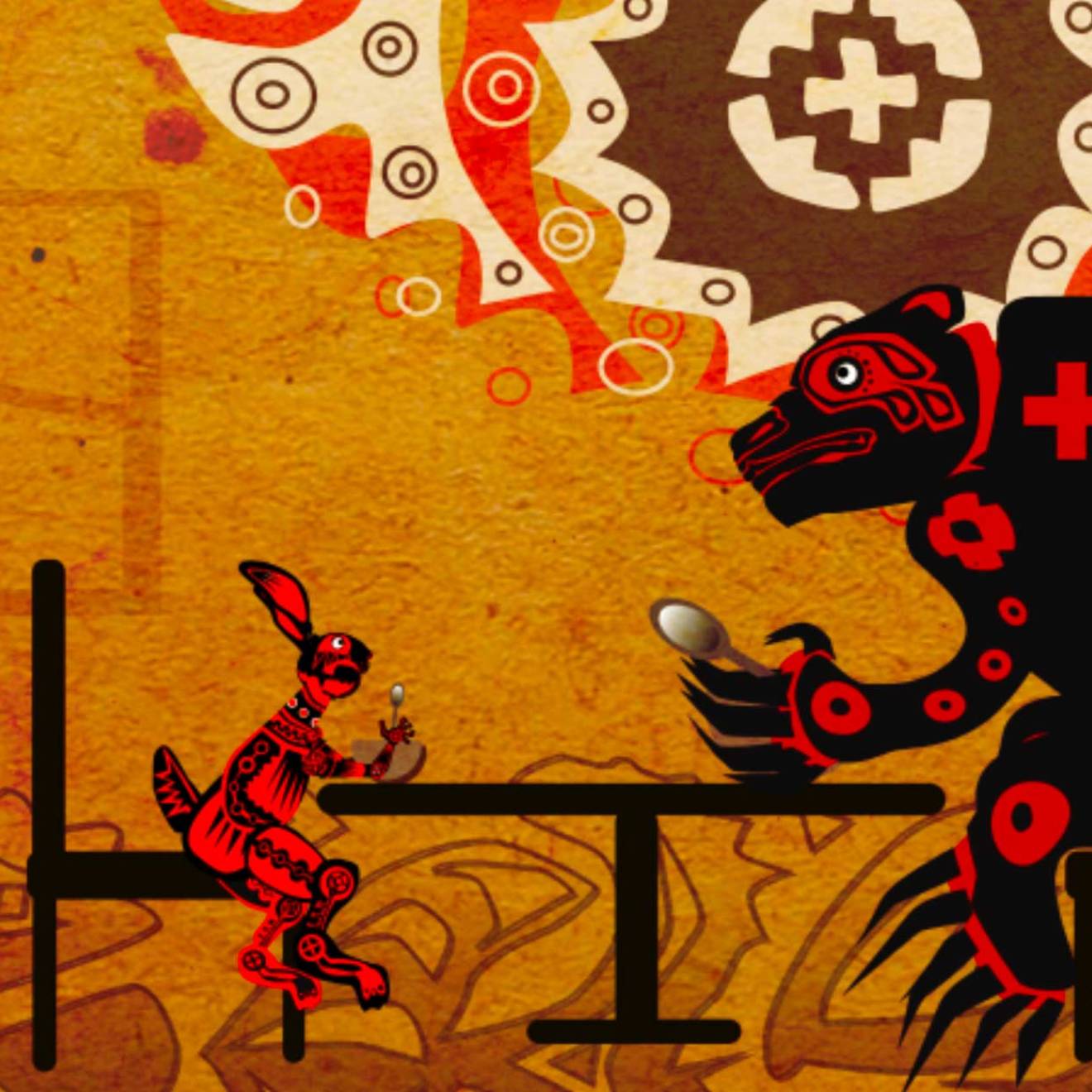Robert Sanders, UC Berkeley
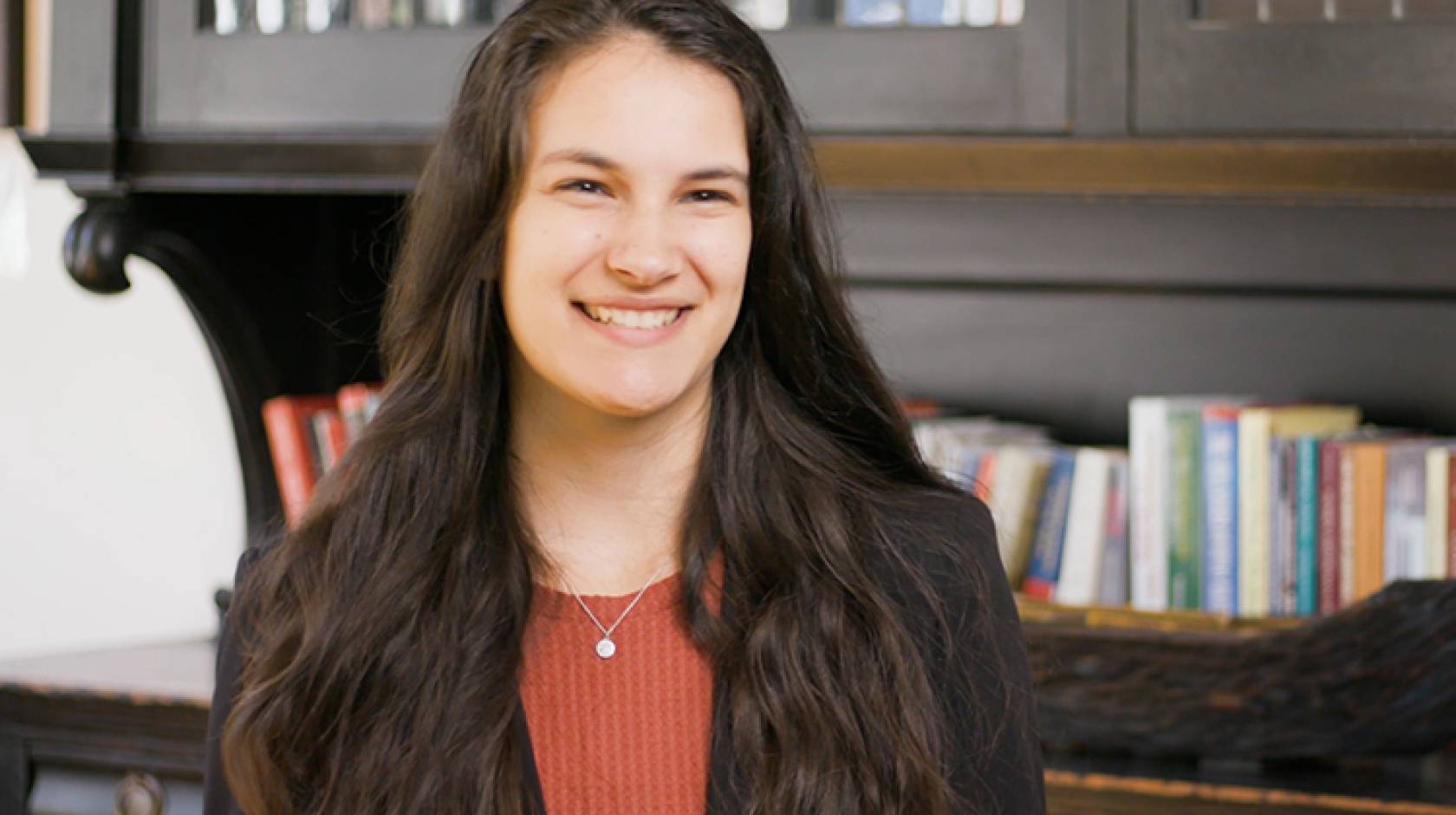
Most members of the University of California, Berkeley’s Class of 2023 will always remember a stressful and disappointing two-year stretch, when the pandemic forced classes online at the end of their first year on campus.
But for graduating senior Catherine “Catey” Vera, those online classes instead were a refuge during the slow death of her father from ALS, or Lou Gehrig’s disease, the illness that afflicted physicist Stephen Hawking. Someone who had been a stable rock in her life was suddenly weak and vulnerable.
Taught via Zoom, pandemic classes provided Vera a haven from the constant need that she shared with her mother and sister to attend to her father’s feeding tube, ventilator and bed sores during his inevitable decline.
“Classes were my safe place,” said Vera, who has always loved the challenge of learning. “Learning new things is such a hopeful thing, which was so needed when I was dealing with this complete lack of hope. I still can’t really fully express what a lack of hope does to someone. Every day, he’s getting worse. There’s only one way the suffering ends, which is death. And there’s no cure.”
In addition, her father’s illness brought back memories for Vera of her own brush with death six years earlier, when she was diagnosed with ovarian cancer. The radical surgery required to remove the tumor ended her dream of becoming a professional ballet dancer.
Together, these tragedies cemented her determination to make the most of life and to do something positive, a mission exemplified by her three years working with UC Berkeley’s Human Rights Center on refugee issues in the United States, Myanmar and elsewhere in the world.
Now poised to receive her B.A. with a major in cognitive science and a double minor in data science and interdisciplinary human rights, Vera has been selected to receive the highest honor for a UC Berkeley graduating senior, the University Medal. She will address her fellow graduates and their families at the all-campus commencement on Saturday, May 13, and receive a $2,500 honorarium.
“I’m so honored to have been selected for the medal,” she said.
A total of 7,075 undergraduates are set to get their degrees this academic year, along with 2,603 master’s degree students and 971 doctoral students.
A ‘blue moon’ student
UC Berkeley’s University Medal is awarded by the Academic Senate Committee on Prizes to the most distinguished graduating senior based on grade point average, scholarly work, extracurricular activities and qualities that make the student “an exemplar of the university’s highest ideals.”
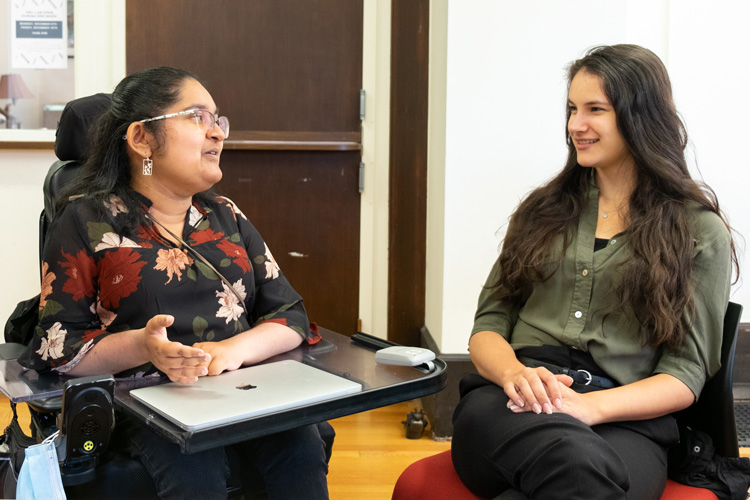
“Exemplar” is an apt description for Catey Vera. Alexa Koenig, co-director of the Human Rights Center in Berkeley Law, praised Vera as the type of student who teachers encounter only rarely.
“Every once in a blue moon you meet an undergraduate student who stuns you with her maturity, professionalism, abilities and insight,” Koenig wrote in a letter of recommendation for Vera. “Ms. Catherine Vera is one of those extraordinary ‘blue moon’ students.”
Koenig cited Vera’s work on three disparate topics: partnering to develop better artificial intelligence to identify misinformation and disinformation on social networks; helping to lead a team that developed a tool to minimize human rights investigators’ exposure to graphic digital material when researching atrocities; and co-leading a team of 12 students in analyzing the biases that go into asylum decisions by U.S. immigration judges.
Vera is currently investigating alleged war crimes in Myanmar through a fellowship funded by the United Nations Independent Investigative Mechanism for Myanmar.
“Ms. Vera is a resilient and innovative self-starter and impressive leader with a deep commitment to the law, who demonstrates excellence in all that she undertakes,” Koenig wrote to the prizes committee.
This experience at the Human Rights Center inspired Vera to follow in Koenig’s footsteps.
“Dr. Koenig is just phenomenal, with the work she’s done to advance human rights internationally and to push for a particular type of human rights investigation called OSINT (open-source intelligence),” she said. “I mean, she’s really my idol. I essentially want to be her when I grow up.”
She’ll have her chance as she enters Yale Law School in the fall, with the goal of becoming an international human rights lawyer.
Prima ballerina
Vera recollects a normal, happy childhood growing up in Palo Alto. Her mother was a lawyer, her father, a software engineer for Google. Vera’s mother put her in ballet class when she was three, and as a normally upbeat person who throws herself into everything she does, Vera excelled.
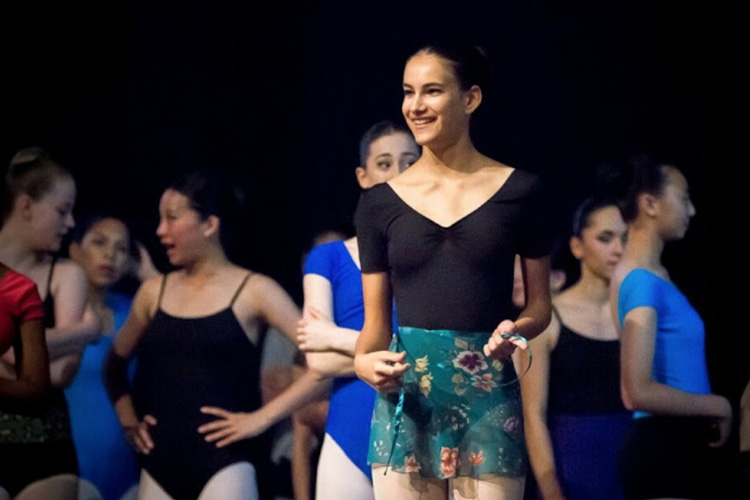
At age 8, she entered a professional ballet school and, once she graduated from middle school at 14, she flew cross-country to enter the University of North Carolina’s School of the Arts, a boarding school geared toward turning out professional ballet dancers. Academic subjects, such as math, which she enjoyed, were relegated to a few hours a day, Vera said.
Her experience was mixed.
“I had a love/hate relationship with this art form, which can be intensely cruel and very stuck in the past,” she said. “It’s very body-focused. It’s understood that performance roles can be granted or revoked based on your weight.'”
The focus on weight — Vera says she was like a stick at the time — became a problem when pain in her abdomen, which doctors thought was caused by a cyst, segued to swelling. Initially, the ballet staff assumed it was weight gain, and at one point, that Vera might be pregnant.
“As a ballet dancer, you have to wear these skin-tight leotards, and it became very apparent that I had some sort of mass growing in my stomach. I don’t want to say it was traumatic, but it was certainly discouraging, because the approach there was, ‘You’re obviously gaining weight. We need to put you on a diet.’”
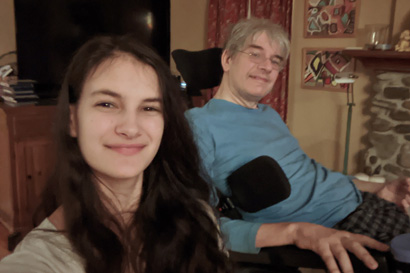
In 2020, Vera took a selfie with her father, James Vera, who was diagnosed with ALS in 2019. Vera helped her mother and sister care for James until his death in 2021.
Only after a local doctor conducted an exam and discovered a hard mass in her abdomen did the seriousness become apparent. Her father flew out to take her back to Palo Alto, where she immediately went into a 10-hour surgery to remove a 10-pound teratoma, a rare type of tumor that had arisen from one of her ovarian cysts.
Luckily, Vera was spared chemotherapy, but the surgery affected her core abdominal muscles, which are key to the athletic moves of every ballet dancer.
“I kept dancing and, in fact, I still teach ballet classes here at Berkeley, but I don’t pretend to be at the same level that I was before. I know it just will never be the same,” she said. “But I was actually simultaneously realizing while I was at this ballet school that this drop in the focus on academics was disheartening. I really enjoy learning. And I really enjoyed, actually, the fact that at school you can wear whatever you want, so you’re not judged by your body.”
So, in the middle of that academic year, she returned to California and entered top-ranked Palo Alto High School, in the heart of Silicon Valley. Coming from a school that considered academics secondary, she found “Paly” daunting, she said.
Nevertheless, Vera thrived in the supportive atmosphere and expanded her horizons, getting her first taste of human rights issues. She founded a local chapter of Amnesty International, writing to heads of state urging the release of wrongfully imprisoned activists. With its reputation for activism, UC Berkeley ended up on her radar screen, and after winning a coveted Regents’ and Chancellor’s Scholarship, she applied and was accepted.
Berkeley’s like a series of interesting TED talks
UC Berkeley was a revelation, Vera said.
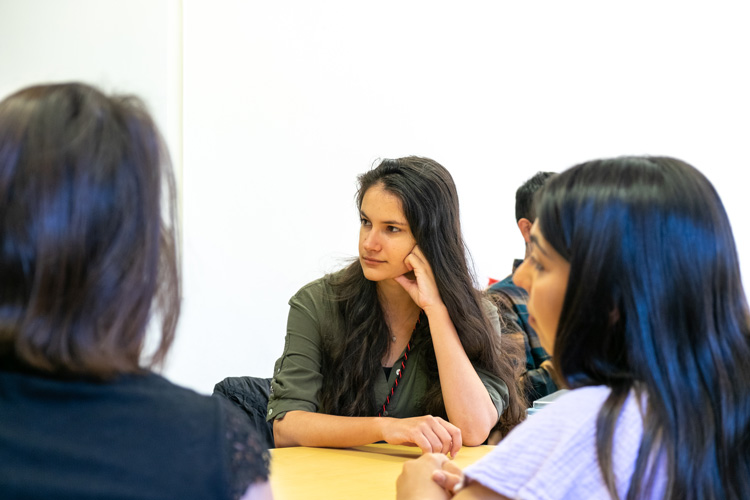
“I love the Berkeley professors — it’s like getting to sit in on a wide array of fascinating TED talks,” she said. “And I love being able to explore new disciplines and the fact that Berkeley encourages students to pursue a liberal arts education.”
Entering as a statistics major, she gravitated toward cognitive sciences, a highly interdisciplinary area that incorporates aspects of psychology, neuroscience, anthropology, linguistics, philosophy and artificial intelligence. She was just getting her feet wet when her father developed symptoms of ALS in the fall of 2019. It was “a knife-to-the-heart diagnosis,” she said.
Then, as the disease began to progress, and she contemplated dropping out of school to assist with the care of her father, the COVID-19 pandemic hit, forcing most students on campus to return home and study remotely.
“Suddenly, I’m home, and everything’s online, and it’s this almost quasi-blessing in disguise that I’m able to continue my education. I realized that I wouldn’t have to withdraw from Berkeley to care for my dad,” she said.
Yet, that meant she saw her father’s depressing daily decline. He eventually lost the ability to walk, then to speak, and eventually to breathe.
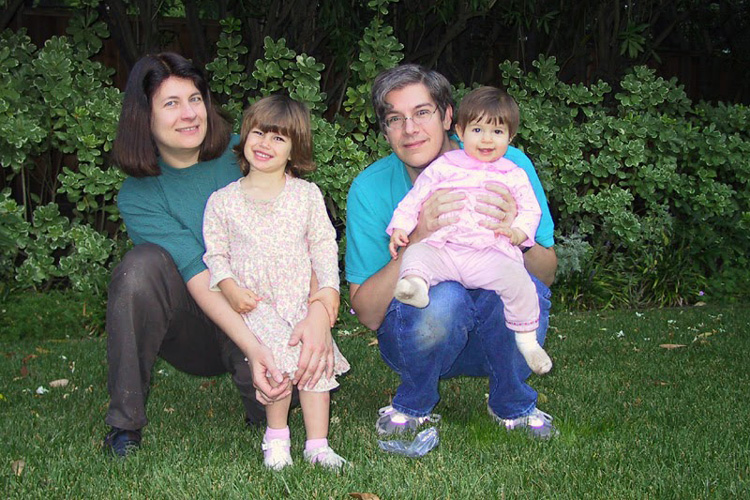
“When the ability to communicate with someone you love goes away, it feels like it’s just the most nightmarish possible disease,” she said. “School is what kept me sane, because the day-in, day-out care of my father — it was intensely laborious work and not very rewarding.”
While fretting over her father, who died in 2021, Vera also couldn’t help worrying about her own future and that of her sister and family members, since some types of ALS are hereditary.
“You’re subconsciously worried that it’s also your own fate,” she said.
She found escape in online classes. One, a film class called Arts of the Border: Refugee Itineraries and Identities and taught by Debarati Sanyal, professor of French, reawakened her interest in refugee rights and international human rights.
“I had just overcome cancer and was watching my dad slowly fade away, and I knew I wanted to do something that was personally meaningful and impactful in the world. I am so grateful to be able to pursue a field of study that genuinely excites me and betters my community,” she said.
Vera volunteered at the campus’s Human Rights Center, surviving a highly competitive application process, and ended up staying for three years, developing her skills as a researcher and scholar. The project she co-led, looking at bias among immigration judges, culminated in a research paper co-written with fellow student volunteers Vyoma Raman and CJ Manna. Vera and Raman presented the paper at the Association for Computing Machinery Conference on Equity and Access in Algorithms, Mechanisms, and Optimization in 2022. The team received the conference-wide Best Paper Award for its work.
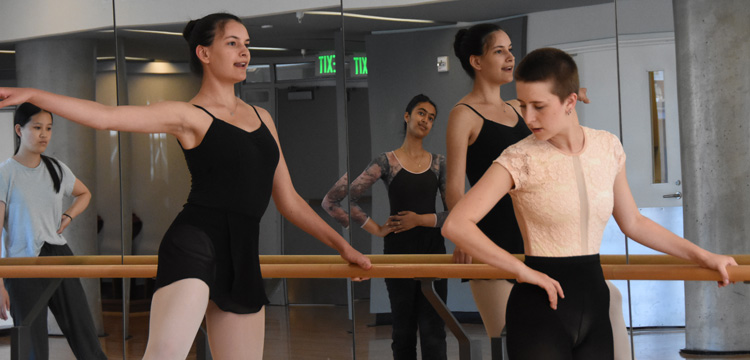
She also worked at Human Rights Watch, served as president of the Prytanean Women’s Honor Society, coordinated volunteer activities at the Berkeley Women’s Daytime Drop-In Center and, true to her love of ballet, served as co-president of the Pointe of Berkeley Ballet Company. The company introduced UC Berkeley students to what Vera refers to as an “empowering” ballet environment.
She serves as deputy editor-in-chief for the journal Review of Human Rights at Berkeley, and for the past year, she has been co-chair of the Human Rights Committee at the United Nations Association for the National Capital Area.
Fluent in French, Vera moved to International House, a residence hall for UC Berkeley students from around the world, once the campus reopened in fall 2021. She also speaks Spanish and started taking lessons in Korean — all while maintaining a 4.0 GPA and widely exploring UC Berkeley’s course offerings.
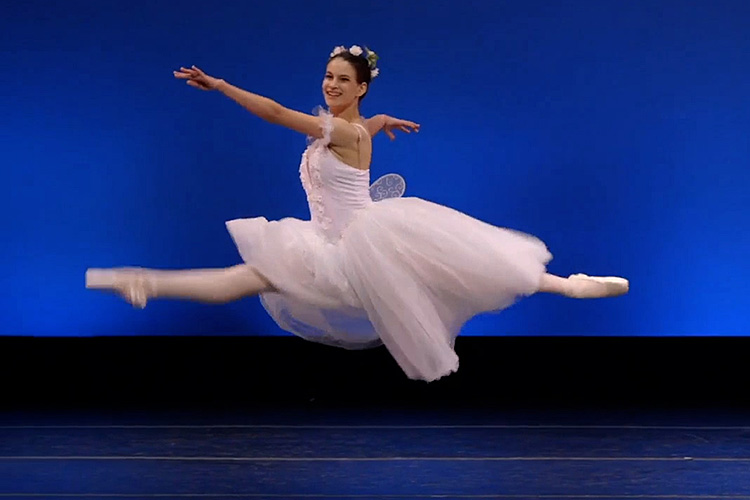
Catey Vera during a ballet competition in 2019, where she performed a variation from “Les Sylphides.”
One of her elective courses was Greek Philosophy, in which she impressed John Ferrari, the Melpomene Distinguished Professor of Classical Languages and Literature, with her probing questions.
These were “questions that gave me pause and made me realize that I would do well to modify my own position on an issue,” Ferrari wrote in a letter of recommendation for Vera to receive the University Medal. “Talking with Catey was, in many respects, like talking with a philosophic equal.”
After a summer at Oxford University in the United Kingdom, Vera will take her probing questions to Yale, where she will study human rights law.
“Graduation will be bittersweet, but I am excited for my next chapter,” she said. “I will cherish the extraordinary people I have met here. Berkeley has been my intellectual safe-haven these past four years, supporting me through times of personal tragedy. My Berkeley education has thoroughly prepared me to embark on the next stage of my life.”
Related information:
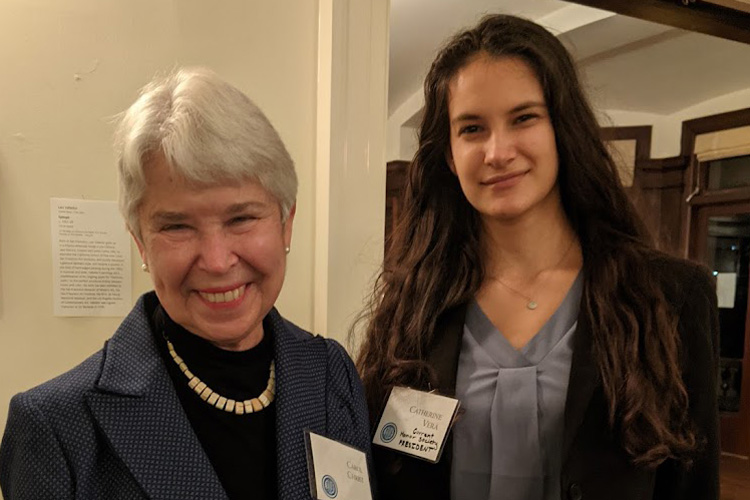
Catey Vera with UC Berkeley Chancellor Carol Christ at a faculty award reception for the Prytanean Women’s Honor Society in 2022.
